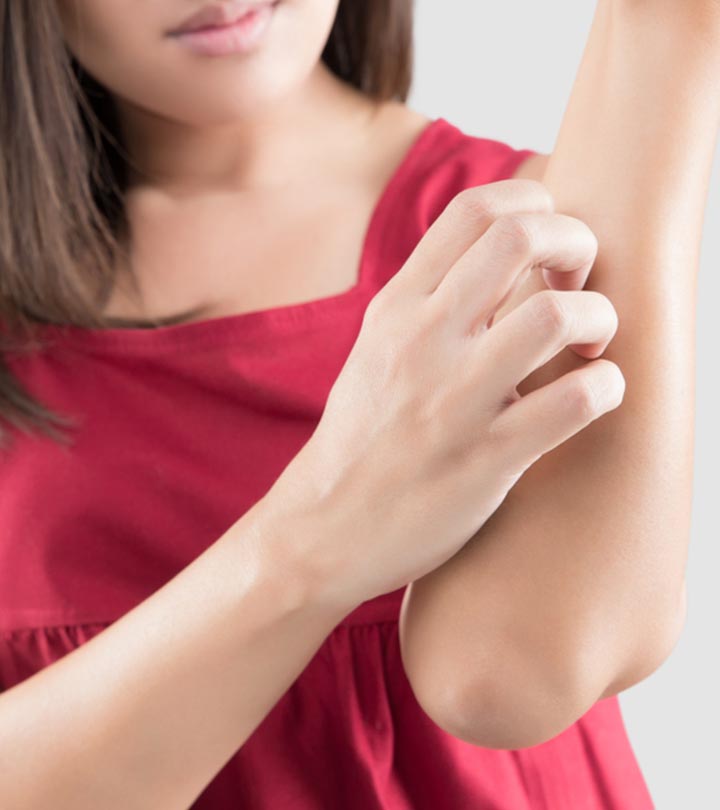Ringworm infection is one of the most common fungal infections that people have to deal with. If you see red, pus-filled patches on your skin that spread to other parts of your body, chances are you have a ringworm infection. The good news is, you can use hydrogen peroxide for ringworms to alleviate the symptoms. In this article, we explore ringworm infection and how hydrogen peroxide is effective in treating ringworms.
In This Article
What Is A Ringworm Infection?
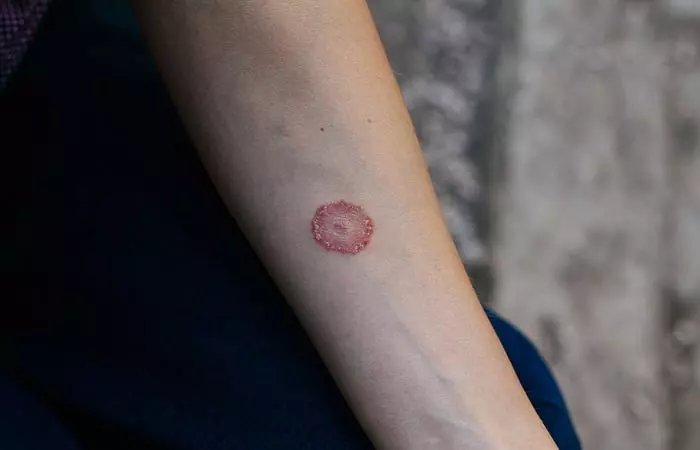
Image: Shutterstock
Dermatophytosis, which is commonly known as ringworm, is a fungal infection. It affects various parts of the body, such as the scalp, legs, toenails, and fingernails (1). Ringworm is a contagious infection and can spread easily from person to person. Dr. Neil Farnsworth, MD, a board-certified dermatologist, says, “Ringworm is the colloquial term for tinea corporis, a superficial fungal infection of the skin often characterized by a red scaly patch in a variably ring-like pattern.”
In some cases, ringworm infection can be contracted from animals. Domestic pets, like cats, dogs, or guinea pigs, can be carriers of this infection (2).
After contracting the infection, one can spot red and itchy spots on their skin. These patches are ring-like in appearance. Scratching is not the best solution as it can cause the infection to spread. If this infection is not treated in the first instance, it can recur. This is where hydrogen peroxide can help.
Related: 23 Effective Home Remedies For Skin Infection
Does Hydrogen Peroxide Kill Fungus?
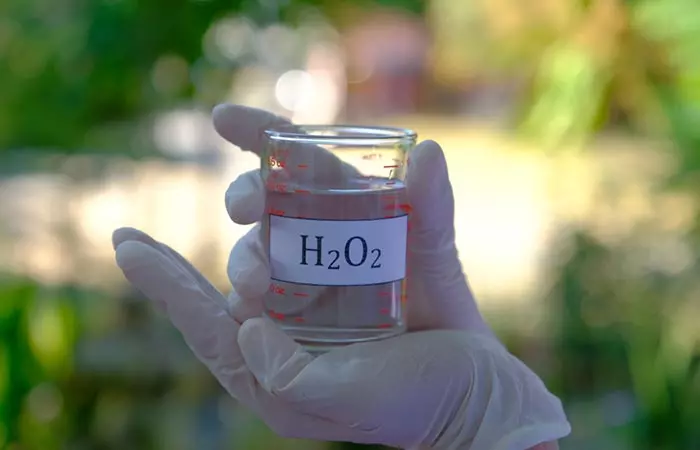
Image: Shutterstock
Hydrogen peroxide has antibacterial, fungicidal, and sporicidal properties (3). These properties may help in disinfecting the affected area and preventing the spread of infection.
Hydrogen peroxide may help in eliminating ringworm infection with regular use. The treatment period may vary depending on the severity of the case.
Related: How To Use Hydrogen Peroxide For Nail Fungus – A Step By Step Guide
How To Use Hydrogen Peroxide To Treat Ringworms
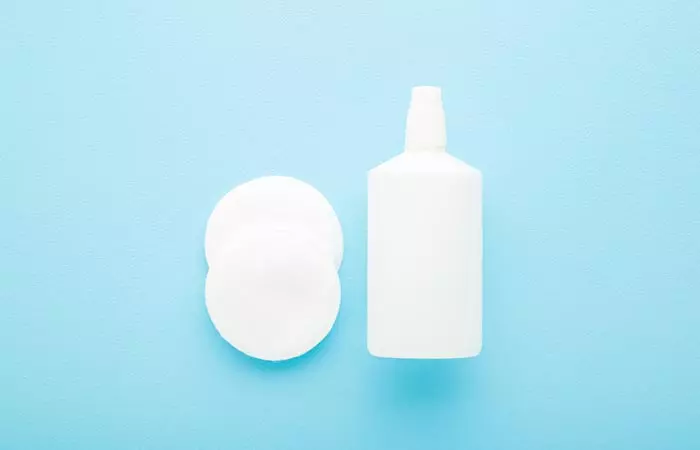
Image: IStock
As mentioned earlier, hydrogen peroxide is a readily available formulation. You may easily procure it from a local chemist. It is also an inexpensive yet effective method that may treat ringworm infection.
A visit to your nearest chemist will show you that hydrogen peroxide is available in varying strengths. For treating ringworms, however, you may need to use a 3% solution.
Dr. Farnsworth adds, “Hydrogen peroxide is toxic to bacteria and fungi, but also to normal skin cells. The prevailing recommendations are to only use hydrogen peroxide to clean out wounds with dirt or other debris in them, or to help remove dried blood. But even then, it should be diluted 1:1 with clean tap water. Full-strength or consistent use of peroxide can actually delay healing by killing the cells trying to heal a wound.”
To administer hydrogen peroxide, you will need a sterile cotton ball. Dilute the solution according to the sensitivity of your skin. Consult your doctor to know how much you need to dilute the solution. Soak a cotton ball in the diluted solution. Apply this to the infected area and leave it on for a while. You may do this a few times daily until you see the ringworm infection subside.
StyleCraze Says You can mix hydrogen peroxide with coconut oil and apply it to the affected area. Coconut oil has antimicrobial and antifungal properties that may help treat ringworm (4).
Just like peroxide, you can also use rubbing alcohol. Dr. Farnsworth says, “Rubbing alcohol is typically a 70% solution of either ethyl or isopropyl alcohol. Hydrogen peroxide in a 3% solution is sold as a wound cleaner and disinfectant. Technically, both will kill the fungus at high enough concentrations and with exposures of over 5 minutes and are therefore often promoted as “home remedies” for ringworm. However, both are also damaging to the skin at such concentrations and durations and are not recommended by medical professionals for that purpose.”
He adds, “Rubbing alcohol strips the skin of its natural protective lipid barrier, leaving the skin dry, cracked, and ironically more susceptible to infection. Large and prolonged exposures can also permit systemic absorption, which is particularly dangerous with isopropyl alcohol.”
Note: Hydrogen peroxide may cause slight skin irritation. It may also cause a stinging sensation on the surface of your skin. If you have sensitive skin, you might experience slight discomfort. In some cases, using a higher quantity of the solution may cause the skin in the affected area to go a little white for a short while. Hence, make sure you talk to your doctor before using this remedy.
Let’s explore some alternative remedies that might be used to treat ringworm.
Does Neosporin Help With Ringworm?
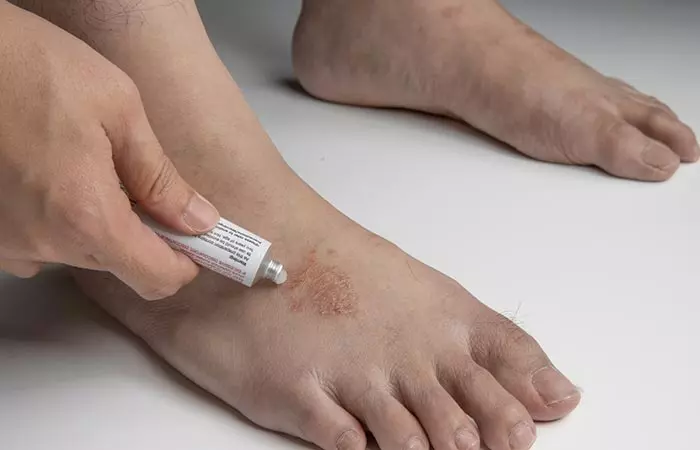
Image: Shutterstock
Neosporin is an antibiotic ointment that is used to treat minor skin injuries. Although there is no significant research connecting neosporin to the treatment of ringworm, it is believed that neosporin might help control the ringworm infection at an early stage.
Dr. Farnsworth says, “The ideal treatment for ringworm is something specifically damaging to the fungus but not the skin. Both prescription and over-the-counter antifungal products target ergosterol, a critical component of the cell membranes of fungi, but not animals. Applying such agents liberally twice daily for 2 to 3 weeks should clear most cases of ringworm with no risk of damage or irritation to the skin. If they don’t, there’s a fair chance that the rash might not actually be ringworm at all, and one should make an appointment to see a board-certified dermatologist.”
Apart from Neosporin, you can use Miconazole, another antifungal ointment to treat ringworm (5).
Related: Should You Use Neosporin To Treat Acne?
Other Alternatives For Treating Ringworm

Image: Shutterstock
- Use an antifungal shampoo to clean out your scalp thoroughly (6).
- Clean your hands and fingernails thoroughly with antibacterial soap.
- If you have contracted an infection, let the infected area breathe by not covering it up with tight clothing.
- Make sure to keep your bed covers washed and cleaned.
- Take a shower after your gymming or workout sessions.
- Do not share clothes, towels, or bed sheets with the infected person.
- Change your socks and underwear daily. Put on socks only after washing your feet and drying them completely.
- You can use a prescription antifungal ointment, cream, or lotion (7).
Dr. Farnsworth adds, “For those looking for a home remedy for ringworm, diluted white vinegar is often promoted as a nonspecific antimicrobial and anti-inflammatory agent. White or apple cider vinegar typically comes in a concentration of 4%-7% acetic acid, with higher concentrations exclusively reserved for household cleaning or agricultural uses. When 4%-7% vinegar is diluted with 4-6 parts tap water, it can have both antimicrobial and anti-inflammatory effects with little risk of damage to the skin, but responses are not terribly consistent or reliable.”
StyleCraze Says You can also use essential oils made from satureja, turmeric, Mexican tea, palmarosa, and ajwain. They have antifungal properties that may help treat a ringworm infection (8).
Infographic: Steps To Use Hydrogen Peroxide To Treat Ringworms
Do you have any red, itchy, ring-shaped patches on your skin? You might have a ringworm infection! But don’t worry! Hydrogen peroxide comes to your rescue! Its components may aid in cleaning up the afflicted region and stopping the spread of infection.
Read the infographic below to learn how to apply hydrogen peroxide to your skin.

Illustration: StyleCraze Design Team
Save the high-quality PDF version on your device now.
Download Infographic
The usage of hydrogen peroxide for ringworms alleviates the symptoms and eliminates the infection. It is one of the inexpensive methods to treat ringworm infection. A 3% solution of hydrogen peroxide is generally used to treat ringworm infections. You can dip a cotton ball in the diluted solution and apply it to the affected area. However, a doctor can guide you on the correct dilution rate and process. You can also use antifungal shampoo for treating ringworm infection. In addition, maintaining personal hygiene helps to reduce the risk of infection.
Frequently Asked Questions
Is hydrogen peroxide harmful to the skin?
Yes. Hydrogen peroxide can be harmful to the skin in higher concentrations, causing irritation, blistering, and burning.
Will hydrogen peroxide stop itching?
Anecdotal evidence suggests that it can help soothe itching due to insect bites, skin infections, etc. if used in the recommended dosages.
Can you bathe in hydrogen peroxide?
Yes. You can prepare a hydrogen peroxide bath by mixing it with water in safe concentrations.
Sources
Articles on StyleCraze are backed by verified information from peer-reviewed and academic research papers, reputed organizations, research institutions, and medical associations to ensure accuracy and relevance. Check out our editorial policy for further details.
- Weitzman, I, and R C Summerbell. “The dermatophytes.” Clinical microbiology reviews vol. 8,2 (1995): 240-59.
https://www.ncbi.nlm.nih.gov/pmc/articles/PMC172857/ - Pasquetti, Mario et al. “Infection by Microsporum canis in Paediatric Patients: A Veterinary Perspective.” Veterinary sciences vol. 4,3 46.
https://www.ncbi.nlm.nih.gov/pmc/articles/PMC5644651/ - Baldry, M. G. C. “The bactericidal, fungicidal and sporicidal properties of hydrogen peroxide and peracetic acid.” Journal of Applied Bacteriology 54.3 (1983): 417-423.
https://www.ncbi.nlm.nih.gov/pubmed/6409877 - Khalid Thebo, Nasreen et al. “Antifungal Potential and Antioxidant Efficacy in the Shell Extract of Cocos nucifera (L.) (Arecaceae) against Pathogenic Dermal Mycosis.” Medicines (Basel, Switzerland).
https://www.ncbi.nlm.nih.gov/pmc/articles/PMC5456225/ - Rotta, Inajara, et al. “Efficacy of topical antifungal drugs in different dermatomycoses: a systematic review with meta-analysis.” Revista da Associação Médica Brasileira (English Edition) 58.3 (2012): 308-318.
http://www.scielo.br/scielo.php?pid=S0104-42302012000300010&script=sci_arttext&tlng=en - Fuller, L C et al. “Diagnosis and management of scalp ringworm.” BMJ (Clinical research ed.) vol. 326,7388 (2003): 539-41.
https://www.ncbi.nlm.nih.gov/pmc/articles/PMC1125423/ - Jain, Neetu, and Meenakshi Sharma. “Broad spectrum antimycotic drug for the treatment of ringworm infection in human beings.” Current science 85.1 (2003): 30-34.
https://www.jstor.org/stable/24107708?seq=1 - Abd Rashed, Aswir et al. “Antifungal Properties of Essential Oils and Their Compounds for Application in Skin Fungal Infections: Conventional and Nonconventional Approaches.” Molecules (Basel, Switzerland).
https://www.ncbi.nlm.nih.gov/pmc/articles/PMC7922942/
Was this article helpful?
“>
Related
The following two tabs change content below.
- Reviewer
- Author
- Expert

Dr. Vindhya L Veerula, MD, FAAD

Dr. Veerula (Dr. V) is a diplomate of the American Board of Dermatology, a Fellow of the American Academy of Dermatology and American Society of Dermatologic Surgeons. She is an energetic, proactive, and compassionate medical practitioner with 5 years of experience and a thorough understanding of overall mind-body-spiritual wellness. Dr.V is on a mission to inspire and teach people to…View Profile ›
Sucharita Mishra, Health & Wellness Writer

Sucharita Mishra has a Master’s degree in Biotechnology and two years of experience in writing on topics related to Health and Wellness. She has worked on determining various heavy metals present in green tea for her Master’s dissertation at CSIR- CFTRI, Mysuru. After completing her degree, Sucharita decided to pursue her passion for writing. She is addicted to all things…View Profile ›

Dr. Neil Farnsworth, board-certified dermatologist
 Dr. Neil Farnsworth, MD, is a board-certified dermatologist and Staff Dermatologist at Lupo Center for Aesthetic and General Dermatology. He graduated from Harvard University and earned his MD from Baylor College of Medicine.
Dr. Neil Farnsworth, MD, is a board-certified dermatologist and Staff Dermatologist at Lupo Center for Aesthetic and General Dermatology. He graduated from Harvard University and earned his MD from Baylor College of Medicine.
Dr. Neil Farnsworth, MD, is a board-certified dermatologist and Staff Dermatologist at Lupo Center for Aesthetic and General Dermatology. He graduated from Harvard University and earned his MD from Baylor College of Medicine.
